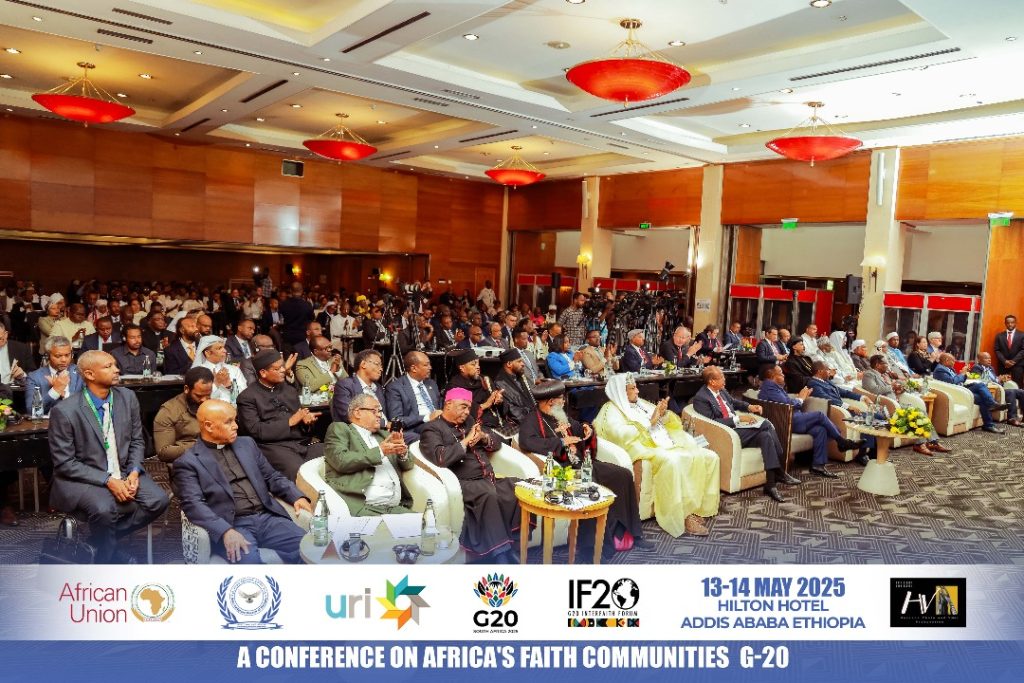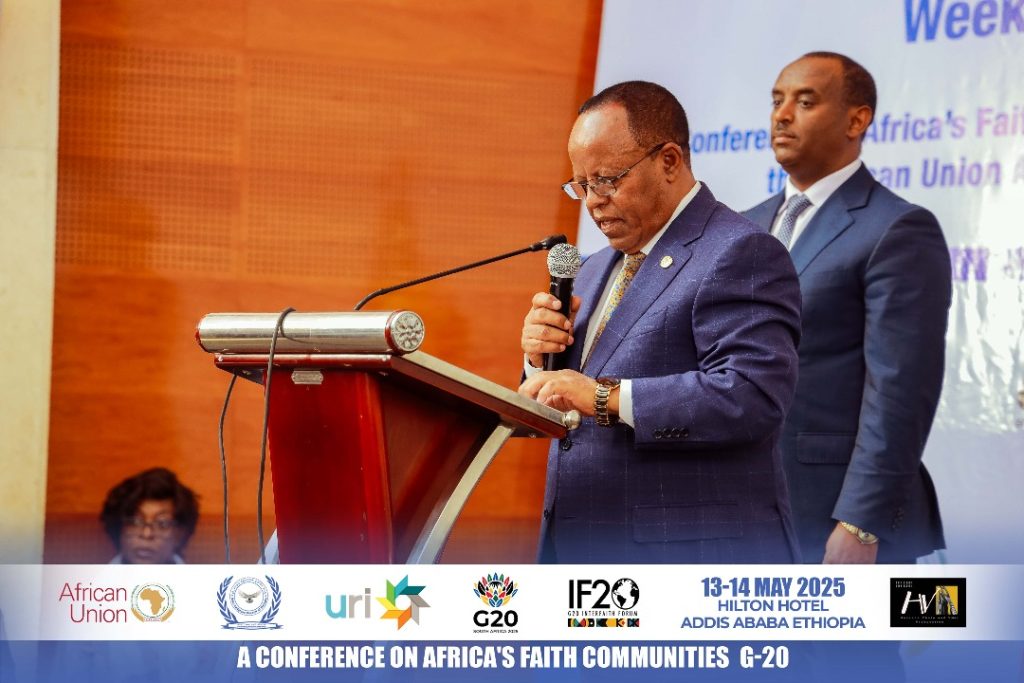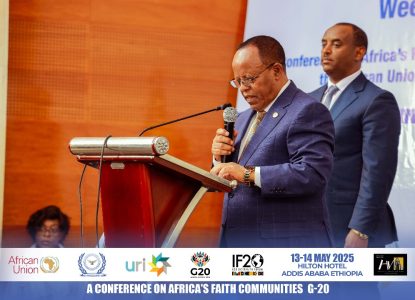By JoAnne Wadsworth, Communications Consultant, G20 Interfaith Forum.
– – –
On May 13, 2025, the G20 Interfaith Forum Association, in partnership with the United Religions Initiative (URI), the Inter-Religious Council of Ethiopia, and the African Union, hosted the opening plenary of a two-day conference on “Africa’s Faith Communities: Advancing the Sustainable Development Goals, the African Union Agenda 2063, and G20 South Africa’s 2025 Process.” The conference celebrated the African Union’s recent membership in the G20 and commemorated the 2025 World Interfaith Harmony Week and Golden Rule Day. Distinguished guests included H.E. Taye Atske Selassie, President of the Federal Democratic Republic of Ethiopia; H.E. Mahmoud Ali Youssef, Chairperson of the African Union Commission; government ministers; religious leaders; and diplomatic representatives from across Africa and beyond.

Opening Ceremony
The conference began with the playing of the Ethiopian and African Union anthems, followed by an interfaith prayer led by religious leaders from the Ethiopian Interreligious Council. A group of youth representatives then delivered a powerful recitation of the Golden Rule as expressed in various faith traditions:
“Do not do to others what would cause pain if done to you,” from Hinduism; “No one of you truly believes until you wish for others what you wish for yourself,” from Islam; and “What is hateful, do not do to your neighbors. This is the whole Torah. All there is is this commentary,” from Judaism, among others.
The recitation emphasized the common ethical foundation shared across religious traditions, setting the tone for the interfaith dialogue to follow.
Welcome Addresses
Teguhan Tagay Tadele (Kesis), Secretary General of the Inter-Religious Council of Ethiopia, welcomed attendees and introduced Ethiopia as “a beautiful mosaic of different cultures, faiths and traditions living together in harmony.” He highlighted Ethiopia’s constitutional guarantee of religious freedom and the separation of state and religion, noting that “all religious and religion practices, cultures, peoples, nations and nationalities are equally recognized.”
Kesis Tadele explained the mission of the Inter-Religious Council of Ethiopia:
“The Inter-Religious Council of Ethiopia actively works in promoting peaceful coexistence, interfaith harmony and cooperation, mutual respect, preservation of the long-standing moral values, religion, ethics, environmental protection, social development and promoting human dignity based on the teaching of the Golden Rule which says treat others the way you want to be treated.”
Ambassador Mussie Hailu, Regional Director of URI for Africa and Representative to the African Union and UN Office in Africa, presented greetings on behalf of URI members worldwide. He described URI as “a grassroots interfaith organization which is working in promoting enduring daily interfaith cooperation to promote a culture of peace, justice and healing for the earth and all living beings.”
Ambassador Hailu congratulated H.E. Mahmoud Ali Youssef on his election as the new chairperson of the African Union Commission and pledged support to advance the African Union’s vision of “an integrated, prosperous and peaceful Africa driven by its own citizens and representing a dynamic force in the global arena.”

G20 Interfaith Forum Perspective
Following the opening plenary, a representative of the G20 Interfaith Forum Association outlined the conference’s objectives and the critical role that interfaith cooperation plays in advancing both G20 and African Union priorities. He emphasized that the forum would focus on concrete recommendations for how faith communities can contribute to implementing the Sustainable Development Goals and the African Union’s Agenda 2063.
“The idea is that we can help address pressing global challenges by drawing on the perspectives of an extensive and diverse set of religiously inspired institutions and networks in order to generate insights, actionable ideas, and support for relevant G20 goals and other priority initiatives.”
African Union Commission Address
H.E. Mahmoud Ali Youssef, Chairperson of the African Union Commission, spoke about Africa’s G20 membership and commitment to Agenda 2063. He emphasized the importance of religious dialogue in promoting peace and security across the continent, noting the African Union’s commitment to creating conditions for economic integration and prosperity while highlighting the vital role of inter-religious organizations.
Presidential Address
H.E. Taye Atske Selassie, President of the Federal Democratic Republic of Ethiopia, delivered the keynote address, providing the conference’s most substantive remarks on interfaith cooperation’s critical importance.
The President opened by acknowledging the challenging global context, welcoming participants to “this timely and critical conference in a world that is marked by division, eroding values, and commercialization of human dignity.”
He made a powerful case for interfaith dialogue as essential to progress:
“Interfaith dialogue is not merely a moral imperative. It is a practical force for progress. When religious leaders unite in advocating for the common good of mankind, they certainly amplify our collective voice and mobilize grassroots actions.”
Drawing from Ethiopia’s experience, the President highlighted how faith-based organizations are already leading humanitarian aid and conflict resolution efforts. He spoke about Ethiopia’s national dialogue process as an example of embracing dialogue over discord.
The President emphasized the indispensable role of religious leaders:
“The contribution of our religious leaders to our national dialogue have been nothing short of vital and indispensable.”
He concluded with an inspiring vision of human potential:
“Humanity and as human beings, we’re not short of ideas. We have that capability given by the Almighty to care for each other. Ideas, great ideas to build peace rather than nurture mistrust. And now the world is being challenged with new sets of ideas. This discourse is not dry, it is alive. So let’s put our ideas and values together and definitely peace and love will prevail throughout the world.”
Looking Forward
The opening plenary set the stage for two days of intensive discussions on topics including building peace, sustainable development, climate challenges, human rights, women’s leadership, and the concerns of refugees and youth. Participants prepared to develop actionable recommendations for the G20 South Africa Summit while strengthening the networks between faith communities across Africa.
The conference exemplified the motto displayed prominently throughout the proceedings: “MAY PEACE PREVAIL ON EARTH.”
— —
JoAnne Wadsworth is a Communications Consultant for the G20 Interfaith Forum Association and Editor of the Viewpoints Blog.


